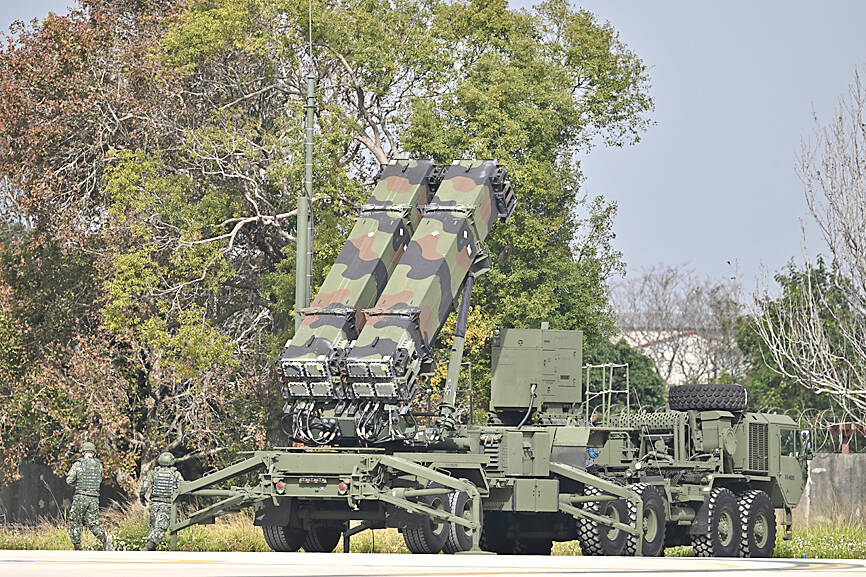The air force is to form its fourth Patriot missile-armed air defense battalion in anticipation of arms deliveries from the US this year and next, a source said on condition of anonymity yesterday.
The Ministry of National Defense has funded the procurement of PAC-3 Missile Segment Enhancement (MSE) systems with the surplus in the defense budget designated for purchasing a less-advanced version of the weapon, the source said.
Taiwan ordered hundreds of PAC-3 MSE systems and is likely to deploy them to defend the airspace over Hualien and Taitung counties, the source said.

Photo: Aaron Tu, Taipei Times
The systems have an estimated maximum altitude of between 45km and 60km, in comparison to the 24km maximum altitude of the PAC-3 system’s baseline variant, they said.
PAC-3 MSE systems have achieved superior performance by using larger, more powerful rockets, which reduce the number of missiles each launch vehicle could carry to 12, down from 15 previously, the source said.
The US is also expected to deliver the first of the three National Advanced Surface-to-Air Missile Systems (NASAMS) Taiwan ordered by the end of the year, the ministry said in February.
NASAMS could engage aerial targets as high as 40km, providing Taiwan with a medium-altitude air defense capability.
The air force is in the process of forming a battalion-level unit to deploy these weapons, the source said.
Separately, the US-based Aviation Week Network last week reported that Taiwan’s international drone-making alliance has quadrupled its membership to more than 200 companies since it was founded in September last year.
The Taiwan Excellence Drone International Business Opportunities Alliance was launched in a bid to align with US requirements to decouple drone supply chains from China, the US outlet cited Aerospace Industrial Development Corp chairman Hu Kai-hung (胡開宏), who also chairs the alliance, as saying.
Members are required to prove the provenance of their components, Hu said.
The alliance includes indigenous drone makers such as Geosat Aerospace & Technology and Thunder Tiger Group, as well as suppliers specializing in the manufacture of key components in drones, he said.
Taiwan faces challenges competing with China’s virtual monopoly over the sector, he added.
“Taiwan is a latecomer to the drone sector, but it can leverage its advanced technology and manufacturing capabilities to cooperate with a growing number of countries that want a reliable alternative to China,” Hu was quoted as saying.
The alliance has partners in the US and eastern Europe, including Estonia, Latvia, Lithuania and Poland, he said.
These nations make ideal partners because they have experience supporting Ukraine in its ongoing war against Russian aggression in a demonstration of their an antipathy to authoritarian expansionism, Hu was cited as saying.
Some of the alliance’s European members have been involved in autonomous military drones, he said.
Taiwan has been looking for manufacturers in Asia that have become wary of being dependent on Chinese drone suppliers, he said.
The alliance is increasingly confident with the security of its supply chains save for rare earths and other crucial materials, which remain under China’s control, Hu said.
Beijing’s weaponization of its control over rare earths and other resources in its trade war with the US is worrisome, he said, adding that some key raw materials utilized in drone making cannot easily be replaced if China cuts off its supply to Taiwan.

The manufacture of the remaining 28 M1A2T Abrams tanks Taiwan purchased from the US has recently been completed, and they are expected to be delivered within the next one to two months, a source said yesterday. The Ministry of National Defense is arranging cargo ships to transport the tanks to Taiwan as soon as possible, said the source, who is familiar with the matter. The estimated arrival time ranges from late this month to early next month, the source said. The 28 Abrams tanks make up the third and final batch of a total of 108 tanks, valued at about NT$40.5 billion

Two Taiwanese prosecutors were questioned by Chinese security personnel at their hotel during a trip to China’s Henan Province this month, the Mainland Affairs Council (MAC) said yesterday. The officers had personal information on the prosecutors, including “when they were assigned to their posts, their work locations and job titles,” MAC Deputy Minister and spokesman Liang Wen-chieh (梁文傑) said. On top of asking about their agencies and positions, the officers also questioned the prosecutors about the Cross-Strait Joint Crime-Fighting and Judicial Mutual Assistance Agreement, a pact that serves as the framework for Taiwan-China cooperation on combating crime and providing judicial assistance, Liang

A group from the Taiwanese Designers in Australia association yesterday represented Taiwan at the Midsumma Pride March in Melbourne. The march, held in the St. Kilda suburb, is the city’s largest LGBTQIA+ parade and the flagship event of the annual Midsumma Festival. It attracted more than 45,000 spectators who supported the 400 groups and 10,000 marchers that participated this year, the association said. Taiwanese Designers said they organized a team to march for Taiwan this year, joining politicians, government agencies, professionals and community organizations in showing support for LGBTQIA+ people and diverse communities. As the first country in Asia to legalize same-sex

MOTIVES QUESTIONED The PLA considers Xi’s policies toward Taiwan to be driven by personal considerations rather than military assessment, the Epoch Times reports Chinese President Xi Jinping’s (習近平) latest purge of the Chinese People’s Liberation Army (PLA) leadership might have been prompted by the military’s opposition to plans of invading Taiwan, the Epoch Times said. The Chinese military opposes waging war against Taiwan by a large consensus, putting it at odds with Xi’s vision, the Falun Gong-affiliated daily said in a report on Thursday, citing anonymous sources with insight into the PLA’s inner workings. The opposition is not the opinion of a few generals, but a widely shared view among the PLA cadre, the Epoch Times cited them as saying. “Chinese forces know full well that